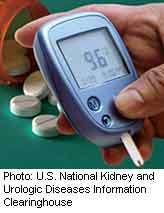(HealthDay)—Lifestyle-based weight loss intervention trials in type 2 diabetes achieve modest reductions in weight and glycated hemoglobin (HbA1c) levels, according to a meta-analysis published in the April issue of Diabetes, Obesity and Metabolism.
Caroline O. Terranova, M.P.H., from the University of Queensland in Brisbane, Australia, and colleagues conducted a systematic review and meta-analysis of the effectiveness of lifestyle-based weight loss interventions for adults with type 2 diabetes. Included studies were randomized controlled trials evaluating weight loss interventions (diet and physical activity, with or without behavioral strategies) of ≥12 weeks duration versus usual care or another comparison intervention.
From six studies comparing lifestyle intervention with usual care, the researchers found the pooled effect on weight (5,795 patients) to be −3.33 kg, and −0.29 percent on HbA1c (5,784 patients), with both findings weakened in sensitivity analyses. From all 10 lifestyle intervention groups, the pooled within-group effect on weight (3,063 patients) was −5.33 kg, which was also weakened in sensitivity analyses.
"Evidence-based approaches for improving the effectiveness of lifestyle-based interventions in type 2 diabetes are needed, along with future studies reporting on maintenance and cost-effectiveness," the authors write.
More information:
Abstract
Full Text (subscription or payment may be required)
Copyright © 2015 HealthDay. All rights reserved.





















